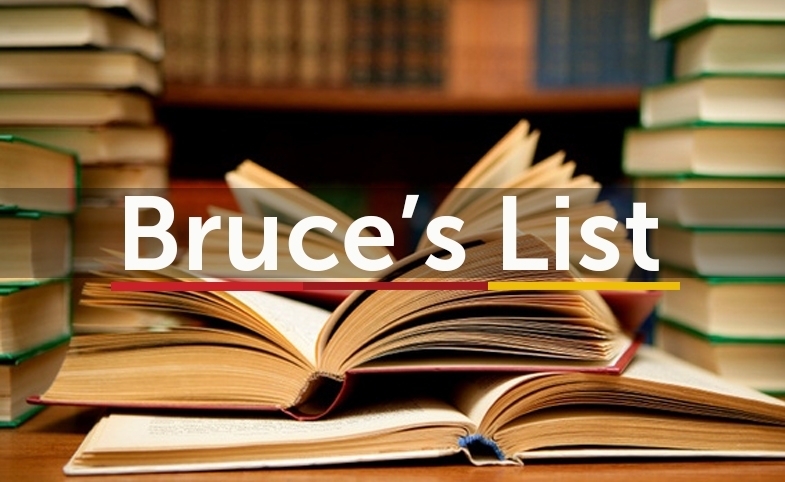The June edition of Bruce Gregory's public diplomacy reading list is now available. Known affectionately at CPD as "Bruce's List," this list is a compilation of books, journal articles, papers and blogs on a wide variety of...
KEEP READING
Latest Must-Reads in Public Diplomacy: September 2017
The September edition of Bruce Gregory's public diplomacy reading list is now available. Known affectionately at CPD as "Bruce's List," this list is a compilation of books, journal articles, papers and blogs on a wide variety of PD topics and features a number of CPD scholars. Highlights from this latest list include:
Costas M. Constantinou, Noe Cornago, and Fiona McConnell, Transprofessional Diplomacy, (Brill Research Perspectives, 2017). In this clearly argued paper, Constantinou (University of Cyprus), Cornago (University of the Basque Country), and McConnell (University of Oxford) contribute to important trends in diplomacy studies – recognition that diplomatic “professionals” exist beyond the state; an expanding “diplomatic realm” that includes multiple actors with new skills and methods in spaces that are not state-based; and increased use of diplomatic practice to illuminate academic study. They frame three areas of inquiry: (1) the genealogy of diplomacy as a profession from its origins as a civic duty to its status as a vocation that, although lacking a “strict professional canon,” requires training, specific knowledge, and skills; (2) diplomacy’s functional differences from other professional categories with global reach; and (3) the proliferation of “new” diplomatic actors “working in parallel to, in partnership with, or in competition with state diplomats.” Building on Geoffrey Wiseman’s “polylateral diplomacy” and related concepts, they suggest “transprofessionalization” (not “deprofessionalization”) offers a promising approach to understanding “the expansion of diplomatic actors and spaces” and “new modes of being a diplomat.” Their arguments are compelling, but they also raise questions. How should we differentiate between diplomacy and other relationships between groups? If we rightly broaden what we mean by diplomatic actors and diplomatic professionalism, how do we avoid excessively expansive claims for both? This is an important paper that opens doors to needed further research.
Mai’a K. Davis Cross, The Politics of Crisis in Europe, (Cambridge University Press, 2017). Cross (Northeastern University) brings her well-regarded scholarship and EU optimism to this study of why EU integration continues despite successive crises. She analyzes the politics of the 2003 Iraq crisis, the 2005 constitutional crisis, and the 2010 eurozone crisis in the context of a deep dive into the media narratives they generated. These crises “to some extent are socially constructed,” she argues. They brought underlying social tensions to the surface that might otherwise have weakened integration. Cross’s innovative research and views on the effects of media, public opinion, and collective emotions on the European project have drawn positive comments and questions. For a thoughtful review, see Asle Toje, “The Politics of Crisis in Europe,” International Affairs, July 1, 2017. It will be interesting to see how her logic holds as Europeans continue to work out the consequences of Brexit and populist impulses in EU member states.
Ilan Manor, “The Digitalization of Diplomacy: Toward Clarification of a Fractured Terminology,” Working Paper #1, Exploring Digital Diplomacy, August, 2017. Manor (University of Oxford), seeks clarity in the variety of terms and concepts scholars and diplomats use to find meaning in the ways digital technologies influence diplomacy. His candidate term going forward is “the digitalization of diplomacy” – a phrase he uses to focus on normative and temporal influences of digital technologies and to construct a taxonomy with four dimensions and four fields. His dimensions are diplomacy’s audiences, institutions, practitioners, and practices. His fields are (1) norms, values, and beliefs; (2) behavioral changes consequent to adoption of norms and beliefs; (3) patterns of use and standard operating procedures; and (4) concepts, metaphors, and mental schemata used to imagine the world. His paper explores characteristics of his dimensions and how they influence each other. Particularly helpful are his links to the research of leading diplomacy and communications scholars. Reactions and discourse on his definition and taxonomy will be of interest – as will case studies that illuminate and give meaning to his concepts.
U.S. Department of State, “Official Communication Using Social Media,” 10 FAM 180, August 24, 2017. State’s Office of Policy Planning and Resources for Public Diplomacy and Public Affairs (R/RPPR) has updated regulations in the Foreign Affairs Manual (FAM) on official use of social media for public diplomacy purposes. Covered issues include required approvals for creating and using social media accounts for official purposes, social media advertising, content restrictions on personal social media accounts, social media site management, impersonations on social media, terms of use and terms of service, and protecting government social media accounts. The new regulations link to earlier FAM requirements that still apply. (Courtesy of Greta Morris)
The full list is available here.
Visit CPD's Online Library
Explore CPD's vast online database featuring the latest books, articles, speeches and information on international organizations dedicated to public diplomacy.
Popular Blogs
-
January 29
-
January 20
-
January 28
-
January 2
-
January 8











